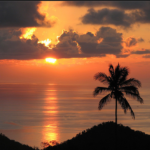This story starts in Belize City, the largest and former capital city of Belize where I spoke to a leading activist, Caleb Oroczo, about LGBT and HIV organizations in Belize. From there I went to San Pedro, a small town on the island cay of Ambergris off the east coast of Belize to talk with half a dozen LGBT people about gay life in this small rural country.
Also see: Gay Belize News and Reports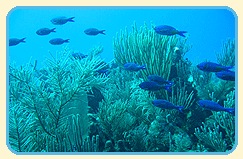
Also see: Belize Photo Galleries
By Richard Ammon
GlobalGayz.com
Part 1: Belize the Country
Formerly a Spanish settlement that became a British colony more than two centuries ago, this small country with a mere population of 300,000+ citizens is the only country in Latin America where English is a predominant language; Spanish and Creole are also widely spoken.
It’s significant that Belize had no bloody civil war as in other Central American countries that left them with bloody tyrants and corrupt dictators for much of the 20th century. Because of the steady British influence over Belize and due to late independence no guerilla insurgency took hold to oppose England’s rule and military might.
For better or worse, the consistency of peaceful politics, even after independence in 1981, has allowed a calm democracy to continue, But strenuous conflicts between subsequent political parties has not helped make the country as prosperous as it should be. Corruption and power politics have taken their toll.
I expected to see a better standard of living. In central Belize City the evidence of substandard living is obvious. Worn out wooden buildings, tattered and dirty, stand along back streets and shelter countless poor families. These are interspersed with cement block houses better constructed but far from pretty.
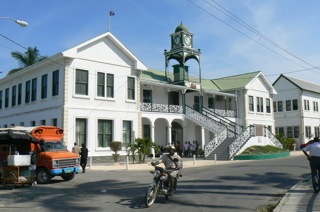 But scattered throughout the city are some charmers such as the colonial-style supreme court building with a clock-tower cupola on Battlefield Square, looking much like a gem from the Indian Raj. (photo left)
But scattered throughout the city are some charmers such as the colonial-style supreme court building with a clock-tower cupola on Battlefield Square, looking much like a gem from the Indian Raj. (photo left)
The city does not ‘gleam’ but rather sits like an old shoe—old but durable–along the water front and bustles with limited commerce, from high tech cell phone service to the wrinkled old man selling string hammocks on the street. The countless tortilla-size eateries includes the grubby-looking Dit’s cafe that makes the best little meat pies in town.
Much as imposed British governance brought organization and stability to Belize, the shadow side of the prudish Victorian rule here was the influence of certain penal laws, especially the punitive sodomy statutes and hostility toward homosexuality. Sodomy is still a crime on the books and homophobia still runs in the cultural blood, in the streets, in schools and among police.
Some say this prejudice is not as virulent as in other Central American countries such as Guatemala or Honduras with histories of social violence and unrest. In Belize, certainly a machismo society, it’s rare to hear of extreme violence or aggression against gay people.
Part 2: Caleb Orozco, UniBAM and AIDS Alliance
Caleb is a charming and disarming laid back person who speaks straight forward yet gently. He described his personal voyage to his current situation as founder and head of UniBAM, the newest LGBT (lesbian, gay, bisexual, transgender) organization in Belize. UniBAM stands for United Belize Advocacy Movement. Its work is a combination of advocacy for rights, HIV stigma reduction and LGBT networking.
Caleb (photo right) knows everything gay here and is one of the point people to see for inside views of the cultural, political, educational and health situation for LGBT people here. From closeted government officials to homophobic evangelists to upcoming lesbian groups, he offered an enthusiastic and balanced view of each aspect of this remarkable country along the Caribbean.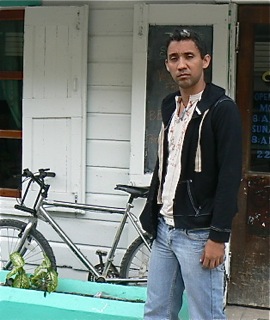
Caleb told stories of his encounters with homophobic bullies during high school but as an adult does not have many war stories to tell about anti-gay violence in Belize. Rather it’s the nonverbal discrimination that LGBT people sense most that comes from ignorance and any lack of effort on the government’s part to counteract rights violations, despite lip service to the contrary.
A supportive commentator recently observed: “Belize needs to do something about the stigma and discrimination against gays and HIV. The country shames itself by having such an outdated view of LGBT. It’s time to have a modern approach to diversity. UniBAM has helped to make a difference, and so let’s give encouragement where it’s due.”
Getting Involved
It was against this social background that Caleb felt Belize was ready for an LGBT voice. Following a survival strategy of many other LGBT groups in Central America, UniBAM’s overt mission is HIV prevention and stigma reduction around the disease as well as advocating against discrimination. Part of his work also involves social policy review of government and NGO programs. (See the 2009 report on sexual rights.)
Also see:
http://www.reporter.bz/archive/view/3713/
Study on Community Capacity:
http://www.advocate.com/Travel/GayWatch/Gay_Watch__Belize/
Since its inception in May 2006 Caleb estimates UNIBAM, through it volunteers, has reached over 400 people with counseling, sex education, food, testing, treatment referrals and medications for opportunistic infections. They mostly make outreach to high risk groups such as men who have sex with men (MSM). Funding for this does not come from the Belize government but rather from abroad.
See the recent human rights ‘We Are One’ videos from UniBAM:
http://www.youtube.com/watch?v=Qp2suU1kJ1U&feature=related
http://www.youtube.com/watch?v=_IXXpSGUCxM
In addition to their HIV work UniBAM vigorously advocates for human rights in general and sexual rights in particular. Caleb is particularly suited for this work since he has ‘friends in high places’ politically and in the media. Caleb has been on TV more than once to educate the public on issues such as homophobia and HIV discrimination.
Caleb also does ‘policy analysis’, which is close review of proposed and existing government policies to ensure they follow the standard sets by the United Nations human rights commission. One of the inconsistencies he is seeking to correct in Belize is the statute that makes sodomy as illegal as it’s perceived to be in conflict with the constitutional right to privacy.
Recent Reluctant Celebrity
In May of 2015 The New York Times featured Caleb in a story about LGBT life in Belize: http://www.nytimes.com/2015/05/24/magazine/the-lonely-fight-against-belizes-antigay-laws.html?_r=0
The report brought worldwide attention to UniBam and Caleb’s personal and professional work.
Alliance Against AIDS
For UniBam’s early capacity needs, credit can be given to the Alliance Against AIDS (AAA) Alliance Against AIDS. AAA is the first and now oldest NGO solely dedicated to HIV and AIDS issues. Founder of the organization in 1997, Rodel Beltran Perera now serves as the Executive Director. AAA offers services to anyone infected with HIV and their families.
It is involved in prevention and education and has influenced government departments, NGO’s , CBOs and FBOs to better respond to the epidemic in areas like Advocacy, Stigma and Discrimination, Positive Prevention, Human Rights and Sexual Health and Sexuality. The first group to receive training in Sexual Health and Sexuality for MSM was UNIDAD 96 which transitioned into UniBam.
On the HIVOS website, (HIVOS is the main funder of the Alliance Against AIDS), describes the establishment of the AAA ”as a group of professionals (gay and non-gay) who have come out into the public arena to develop actions and support for people affected by HIV/AIDS.”
Also see: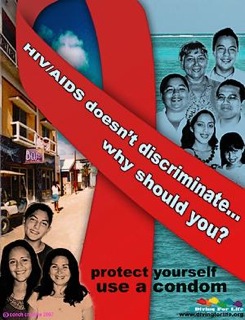
San Pedro Sun story
Government Report
The volunteers and professionals who make up AAA come from key institutions (NGOs, Universities, Medical Institutions). Support actions for HIV/AIDS people include individual care and support such as money for medications, travel to medical clinics, and peer counseling. They also distribute condoms, participate in radio and television media to increase social consciousness on the subject of AIDS, participate in international seminars and in national networks that approach the subject.
According to the Belize Ministry of Health: “The third quarter while showing a relative similar pattern to that in 2008, maintains the relatively below average numbers reported in quarter one and two of this year. During this quarter, 76 new HIV infections were detected bringing the total for the first three quarters to 245 cases which is significantly below the average reported in the previous seven (7) years.” Obviously AAA is have a positive effect in Belize. See: Government Publication 2009
AAA serves anyone in need of health services whereas UniBAM is focused only on LGBT people for various needs, but both groups coordinate efforts. UniBAM is a member of the larger CONGA coalition (Coalition of Gay Organizations in Central America).
MSM Health Care
The importance of UniBAM’s and AAA’s work remains as the country struggles to address MSM health care needs and in improving data collection, both slow in progress. The urgency for the data is reflected in the daunting estimate that 18% of the adult male population is MSM, which is likely a low figure. Throughout Central America other studies show 60-70% of men are MSM. In Belize there has been no actual research or studies done on this matter.
“How can they formulate appropriate policy without the basic sources,” Caleb asks incredulously with a cynical laugh. “The problem is the government is constrained from targeting any particular population because of limited resources, so they say.” (This despite millions of dollars from foreign organizations and governments for this work).
UniBAM’s intention is to build LGBT community spirit around their center in the near future, but it costs money to staff and furnish an office and make provisions for social activities.
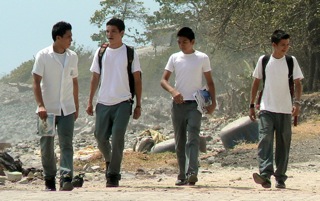 Caleb has clearly set his path against LGBT discrimination in Belize regardless of place or person or organization. He is committed to opposing discrimination in all forms at all levels of society.
Caleb has clearly set his path against LGBT discrimination in Belize regardless of place or person or organization. He is committed to opposing discrimination in all forms at all levels of society.
Is he at risk of harm? Only from verbal taunts or barbs he said. “I’m a visible target but fear cannot control the need for action that involves justice. We are not that kind of country where a person gets killed brutally on a regular basis. Occasionally I get a verbal insult but I always throw a one-liner back. If someone says to me ‘bonfire’ (a Jamaican term for faggot, meaning go to hell) I just tell them ‘you first’.” With a laugh he said, ”I’m a punk but I’m not going down like a bitch!”
Part 3: Alex and Leonardo in San Pedro
San Pedro is a small ‘resort’ town on the island of Ambregris Caye off the east coast of Belize, near the barrier reef–the second longest in the world, about 125 miles long.
Alex and Leonardo (photo right) are a thirty-something gay couple of three years who rent a small two-bedroom bungalow (US$800 a month) in the outskirts of San Pedro among other simple wooden houses on unpaved roads. Native palms and broad-leaf flora add green to the white sandy ground of this quiet residential neighborhood.
Leonardo’s heritage is Mayan and Alex’s is Spanish; Leo is darker and shorter, Alex is lighter and taller. They both speak fluent Spanish, English and Creole like most people in Belize. A visitor would be hard pressed to find any evidence of homophobia in their lives as they go about work, play and the tasks of everyday routines such as food shopping (especially tortillas and local Belikan beer), pet grooming (3 cute dogs) repairing their bicycles (one motor scooter, two bikes, no car).
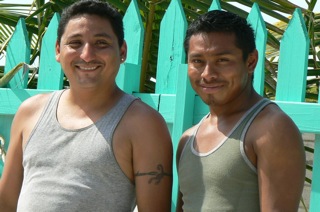
The story of their becoming a couple is a bit circuitous as they had to unwind from previous relationships, resist returning to other amours, free up from possessive ex-lovers and fend off temptations by fickle cruisers. Finally after knowing each other for a year, off and on and online, they made a monogamous commitment that has stabilized their lives away from the impulse and confusion of their twenties.
They no longer appear to want to play the cruising or dating game anymore. “I got tired of the time and lies for doing that, said Leo. “It’s more relaxing to be at home with Alex and the dogs and just hang out with some friends for TV or dinner.”
They value their time at home and are fortunate to each have one job that supports their modest lifestyle. Many Belizeans need two or three jobs to make ends meet since salaries are low, about $500-1000 a month in a country that is not the cheapest in Central America.
There is a strong alignment with America here and locals lucky enough to be employed by one of the many American companies here tend to get more pay. Leo works for the Coca Cola distributor in San Pedro. Alex works for a telephone company and also repairs computers on the side.
Belize Gay Guys
Are Belizean gay guys different? I asked as an open-ended entre to our talk over lunch at thatch-roofed BJ’s bar-grill on the sand near their house (no place in San Pedro is far from the water). Alex thought most gay men were more macho here regarding their homosexuality. “They’re in the closet and they think ‘I’m not like you, I’m different’, so that keeps them in the closet more—that’s for the middle-age and older ones. The young ones are more out and don’t care as much if people know.”
As for long term relationships, they seem to be enigmatic. Even Alex, with his varied exposure to many different situations and people, paused to think for a few seconds before he could name a couple of over ten years. He knew four other couple in San Pedro and others in Belize City, He also knew of several older ‘daddies’ who pay younger guys for sex but the longest-term couple he vaguely recalled was about 12 years.
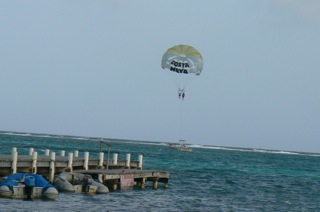 The ‘gay community’, if one can call it that, is composed mostly of closeted married people with kids (continuing the family lineage is important) who don’t gather in any unified way but rather have their secret sweethearts and a few close friends. Other LGBTs are openly gay couples who live together, locals like Alex and Leo and expats like Colette and Maya (see part 4). Add to this the free-flowing LGBT tourists who drop in for a week or a month of sun, sea and pleasure.
The ‘gay community’, if one can call it that, is composed mostly of closeted married people with kids (continuing the family lineage is important) who don’t gather in any unified way but rather have their secret sweethearts and a few close friends. Other LGBTs are openly gay couples who live together, locals like Alex and Leo and expats like Colette and Maya (see part 4). Add to this the free-flowing LGBT tourists who drop in for a week or a month of sun, sea and pleasure.
As well, there are numerous ‘quietly gay’ people, not closeted–not public, who work in city government or at the local San Pedro Sun newspaper. But there is hardly a ‘cruise’ scene since the few venues that gays favor are also favored by straight folks so the energy is fused with beer, loud music, dancing and the usual shouting to talk. And if two guys or women decide to leave together hardly anyone notices in San Pedro. The place lacks the risks of downtown Belize City which tends to be inhabited at night by poor thieves interested more in someone’s wallet than their body.
Regarding Homophobia
It doesn’t help that the country is heavily Catholic with a good dose of Protestant churches. Indeed, on the ferry ride from Belize City to San Pedro there were two Mormon guys in their usual uniform of short-sleeved white shirt with tie–with name tags–and dark pants, looking ultra-scrubbed and ready to spread the word.
A small example of attitude shift here was the kafuffle caused last year when a male high school student in Belize City started attending school in a feminine attire and carrying a handbag, much to the chagrin of the principal and derision of other students. Not surprisingly Jose Garcia was expelled. (photo right, not Jose)
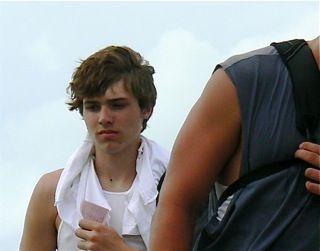
For while he become a cause celebre of international human rights organizations who condemned his expulsion and demanded the government intercede and demonstrate its commitment to human rights. It was a tempest in a teacup but as Caleb observed, it served to raise the issue of LGBT rights that otherwise would not have been noticed. “Sometimes conflict brings change for the better.”
Jose was allowed back in school after he signed a contract to wear gender appropriate clothing. “A positive effect from this situation,” Caleb noted, “was that the Ministry of Education actively discussed high school sexuality issues and how these can be reflected in policy schemes.”
Alex and UniBAM
Alex is Caleb’s cousin and is the financial director of UniBAM. Alex worries somewhat about Caleb because of Caleb’s ‘daring’ approach to confronting homophobia and ‘gay attitude’. “He has been assaulted more than once with a weapon…but he’s a fighter. I guess he will survive with his wits and strength.” Alex was one of the founders of UniBAM in 2001 helping deal with funding and the paperwork required to register as a group.
Caleb and Alex and other volunteers have made trips to other towns in Belize to present sex and HIV education seminars, offered discretely by word-of-mouth invitation only to LGBT people. Alex and Leo have hosted some of these seminars at their home in San Pedro, once drawing several dozen people.
In the matter of discrimination in Belize, Alex observed that there was actually little discrimination among the ethnic groups. He would feel comfortable dating any guy from a different ethnic background than his own Spanish heritage. Proof of this is that Leo is from Mayan lineage and they have friends with diverse mixed backgrounds (mestizo).
“The only prejudice I know of is against someone who is slutty, crude or immoral,” laughed Alex.
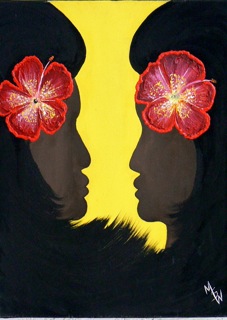
As we were finishing lunch, a lesbian couple, friends of Alex and Leo’s, came walking along the beach in bare feet and sat down for a short visit, Cherie and Inez. They were a cute couple in their late twenties out for a stroll on a Sunday, a favorite activity that never ceases to appeal. They were totally at ease and talked small talk with the boys. Cherie mentioned that when they felt like going to a gay place to dance they took the boat ferry to Belize City (which she thought was “dangerous”) and a bus to the Mexican border town of Chetumal, to a classy LGBT-mixed club called LePink, opened August 2009. (Also see gay Chetumal pride parade, the closest thing to a Belize Pride parade.)
Part 4: Colette and Maya
Colette and Maya (see Gay Belize story on GlobalGayz 2009) are another face of the LGBT community: they are lesbian couple of eight years, British expats, who seven years ago, packed up their lives, sold their business and moved to the sunny south in Belize (after having visited several times to scope it out). They have not looked back since. A new house, new pets, new interests, new friends, new culture—a new life indeed.
“There’s a gay community here for sure, but I don’t identify them as ‘gay’ or a ‘community’ as such. Every person who lives here is the community and LGBT people are part of that. I don’t separate people into categories. I’m a whole person and I have my unique style of being in San Pedro,” said Colette as we ate breakfast at one of the hundreds of eateries in oceanfront town of San Pedro.
“Sexuality is not just a set of categories here. It’s a flow of energy and each person shapes it as suits their nature,” said Colette. The varieties of sexual expression are as widely diverse as the sea life along the reef just offshore Gay, straight, bi, married woman with kids and no dad, unmarried woman with kids, married man with an outside ‘sweetheart’ lady and others with ‘sweetheart’ boyfriends on the down low; some secret, some open, some open secrets…
‘Be Kind Belize’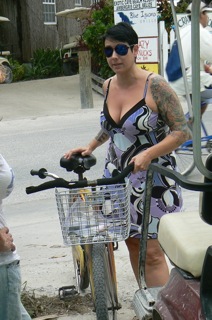
Colette (photo right) and her partner Maya keep busy with their own professional work as photographers. Colette is also involved in a school program she developed called ‘Be Kind Belize’, an eight-week class that teaches kindness and respect for oneself and others. It’s an 8-week practical course that also includes parenting issues. In a country where girls start having babies at 16 or 17 such a course is highly valuable.
In fact, many girls start in their mid-teens to produce 10 or more children with different men; many men are in jail for child sex abuse, while others, older expats using the guise of ‘adopting’ a local poor family with a pretty daughter, offer money for education and the ‘comfort’ of the daughter, a situation that angers Colette. She produced and teaches the class herself with government approval but no financial support.
Expats
Many expats move to Belize, Colette observed, but 80% go back home. The trick is to be flexible, adaptive, open minded. “You can’t expect to bring your culture with you here. Despite the appearance of the many condo communities with their pools, manicured gardens, golf carts and other expats (many renting for a month or less) the milieu is different: less hurried, prone to thievery, indifferent to timetables or deadlines, inconvenient, corrupt officials to be courted with bribes… “far less anal,” she laughed.
She noted the many Mennonite farmers in Belize, who raise most of the poultry for local and national markets. They get along reasonably well with the locals as they too are calm and slow, although methodical. They can be seen driving around in their horse buggies and wearing black-brimmed hats.
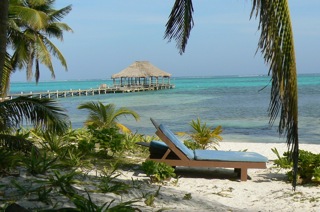 San Pedro is Special
San Pedro is Special
But this town is not usual in a country of only 300,000+ people who derive from a multiplicity of heritages: Mayan, Spanish, African, South America, European, Mexican.
San Pedro is a resort town with all the expected trash and treasures. It ranges from five-star beachfront hotels to backpacker hammocks and numerous 2-star cozy hostels steps from the water.
San Pedro is quite laid back and superficially calm about homosexuality. This no doubt has to do with the number of LGBT people living on the island, both native and visitor. Not that a same-sex couple can walk hand in hand along main street, but virtually everyone knows at least one gay or bi person or is one themselves. (In Central America, estimates range widely from 20-60% of men (married or single) are MSMs. WSWs, including bisexual women, are fewer but quite present.)
On a busy night a visit to Jaguar nightclub or the Caribbean Sports bar or Big Daddies or Amigo bar will reveal a reasonable crop of LGBTs drinking or dancing among the locals and no one caring who is with whom.
The common ‘levelers’ of society in a resort place like San Pedro are sun, sea and casual personal connections, gay and straight. This island, this country relies a lot on tourism (9% bed tax in all hotels) and any wrinkle in the welcome mat can disrupt the flow of tourist dollars. San Pedro has a warm reputation of being laid back. Many diverse people have moved here full time or are repeat vacationers.
Part 5: Felix and the HIV Commission
From a single desk in city hall, Felix Ayusa runs the San Pedro AIDS Commission (SPAC), a modest public information and education program that works to prevent HIV infection, reduce stigma and raise awareness about health issues. It receives no money from the government but is supported by money from The Global Fund and the U.S. embassy in Belize.
See these reports about the HIV Commission: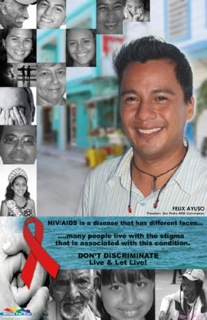
San Pedro Sun story 1
San Pedro Sun story 2
San Perdo Sun story 3
Another source of funds, in 2008, was from the Diving For Life event, a LGBT charity jamboree sponsored by USA and Canada scuba divers who, when not under water, put on a drag show and charge admission to see the colorful, campy and spirited performances.
Started and staffed by volunteers four years ago SPAC has produced wall murals that advise sexual caution, broadcast infomercials on local TV, made posters, pins, brochures, student booklets for junior and high schools students and provided free German-made condoms. (Two condom machines have been installed, one at Jaguar and one at Amigo bar.) Junior high might seem young but, as Colette pointed out, in Central America there’s a high rate of unmarried teen pregnancies. Kids learn early about sexuality.
SPAC also does educational presentations in schools, bars and has a food and information stall at carnival and other festivals in the central square of town. There’s a sparkling boat parade in early December following World AIDS Day on December first.
That’s when the AIDS walk occurs each year, with about 150 participants. We raise two to three thousand dollars for our programs,” said Felix., “but surprising or not, not many gay or lesbian people do the walk. The closet is still quite full here despite the friendly atmosphere. Native people still fear the stigma surrounding being gay and having AIDS.”
A second purpose of the SPAC is to assist people with AIDS (PWA). “Unfortunately we can only help the ‘worst’ cases since our funds are limited. We help with some money for rent, food, transportation to Belize City for medical appointments, doctor’s fee and some medications.” (Most meds are government provided but not all.). “We offer social support, with volunteers who are trained to be basic caregivers and offer friendship and sympathy.”
Finally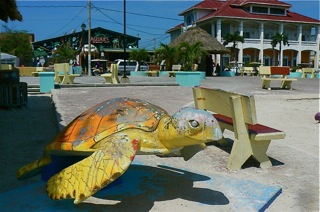
I left Belize with a warm affection for the people I had met in this sweet and sour country, a rural wilderness with a stunning coast of aquatic beauty, a humble kindly people who survive on meager means and with ignorance about sexual diversity.
Here a tiny cadre of liberal gay activists wage the slow battle against a machismo culture to change attitudes about homosexuality, women’s rights and sexual equality. It’s a very gradual course but they move ahead step by step, day by day—the Belezian way. (photo: San Pedro central plaza)


